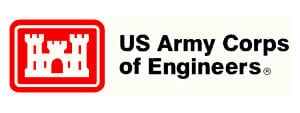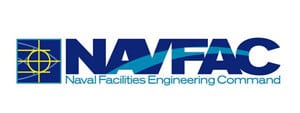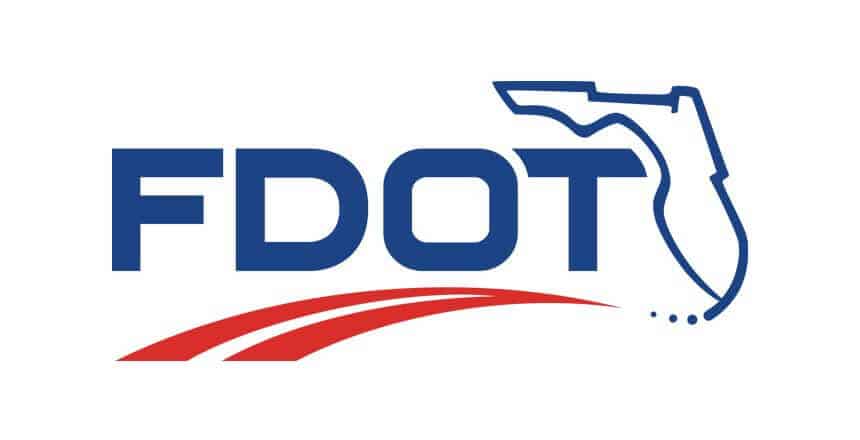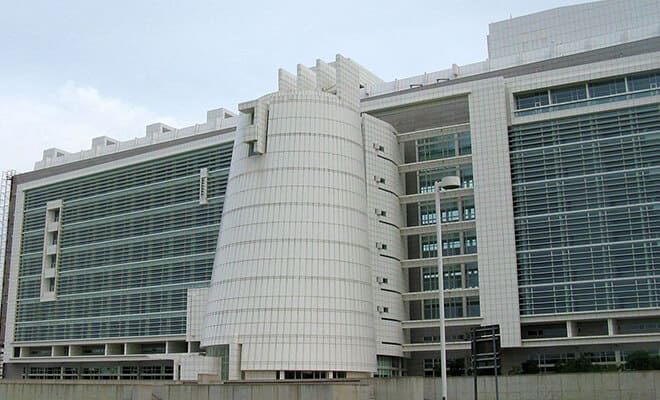HSE’s schedule engineers have between 5-20 years of construction field experience. We understand that understanding construction and spending time in the field is more important than software skills. We only hire engineers who have actually worked on site for a minimum of five years so they truly understand how construction works so we are truly capable of creating comprehensive construction schedules from scratch. All we need is just a link to the dwgs and we are ready to take the ball and run with it. HSE has been doing schedules over the past 20 years so we have created our own database of conservative and aggressive production rates for all different trades. We do our own take offs from the dwgs to determine the quantities. Then based on the quantities we determine which production rate to use and by multiplying them we are able to develop realistic durations which are the back bone of any reliable schedule.
HSE Contractors is proud to employ the most experienced project controls professionals in the industry. Our extensive construction industry knowledge allows us to plan our clients’ entire project from day one through commissioning. By wisely allocating required resources and anticipating possible risks before they become reality and impact your project, we can help you achieve your project goals.
We use the best industry scheduling methodology, Critical Path Method (CPM) scheduling, to produce reliable, achievable timelines and help project managers deliver their projects both on time and within budget. CPM Scheduling is a project management technique that identifies the chain of activities that control the overall project completion date. Our HSE-created CPM scheduling network analysis takes into account all necessary tasks, estimated durations, required resources (manpower and equipment), and precedence procedural relationships needed to accomplish complete task workflows.
The CPM is then updated with actual field information and corrective modifications added at regular project increments. Our team utilizes Oracle Primavera P6® as well as Microsoft Project® and other needed software in order to construct, control, and analyze schedules throughout the lifetime of your project.
Why is CPM Scheduling used?
Critical Path Method (CPM) Scheduling is a project management technique where the chain of activities that control the overall project completion date are identified in order to help superintendents and project managers achieve project milestones. Starting with site permits, going through material submission and approval cycles, through long lead items that link up with installation in watertight zones, all these steps will be studied to ensure critical activities are extracted and monitored using the schedule.
An HSE-created CPM scheduling network analysis takes into account all necessary tasks, estimated durations, required resources (manpower and equipment), and precedence procedural relationships needed to accomplish complete task workflows. The network calculation consisting of a forward and backward mathematical pass then determines driving critical path(s) resulting in determining task early and late dates, total floats, and estimated milestone and/or project completion.
The CPM is then stated with actual field information and fully updated by adding corrective modifications at regular project increments.
Our team utilizes Oracle Primavera P6® as well as Microsoft Project® and other needed software in order to construct, control, and analyze schedules throughout the lifetime of your project.
Our CPM Scheduling services include but are not limited to:
- Developing Comprehensive CPM Schedules
- Resource/Cost Loading
- Projection Cash-Flow Management
- Manager's Reports Generation
- Recovery Schedule
- Monthly Updates
Developing Comprehensive Critical Path Method (CPM) Schedules
At HSE, we specialize in developing comprehensive critical path method (CPM) schedules that enhance the efficiency and success of construction projects. With over 100 years of combined professional staff experience, we are committed to adding value to our clients’ projects through scheduling and management excellence.
We believe that project controls, incorporating CPM, Linear, and BIM integrated techniques, and Risk Management, are crucial to delivering a project on time and with the highest efficiency. Unexpected events and changes can impact construction projects, and a CPM or Linear schedule, along with accurate contemporaneous documented updating, is essential to monitor progress and make informed decisions.
At HSE, we emphasize the importance of project team participation at all stages, proper application of schedule relationships, good construction and organization, and less ambiguity in work identification. We practice rigorous, timely, regular, and accurate updating practices and ensure buy-in and use by all members of the project team.
Our CPM scheduling experts also have extensive experience in construction claims analysis and issues involving delay, disruption, and project acceleration. They can assist in crafting a schedule that anticipates potential complications and in quantifying any damages related to scheduling adjustments.
Let our offices in Orlando, New York City, Boston, Los Angeles, San Francisco, Miami, Tampa, Chicago, Denver, Brooklyn, Dallas, and Washington, DC offer you innovative and efficient solutions on a variety of construction projects nationwide. Contact us today to discuss your project needs.
Resource/Cost Loading
Once the scheduler has developed the scheduled activities, the next step is to assign material, labor, and equipment resources to each activity. This enables the production of Resource Histograms, which track planned versus actual manpower on a weekly or monthly basis. With this information, project managers can determine when and by how many laborers per day they are short, and whether or not this explains any deviation from planned progress.
Cost loading is an essential tool for generating impressive billing reports to support payment applications. This tool enables the production of planned versus actual S-Curves to monitor project financial performance and earned value over time. It also helps track critical metrics such as Cost at Completion (CAT), Cost Performance Index (CPI), and Schedule Performance Index (SPI).
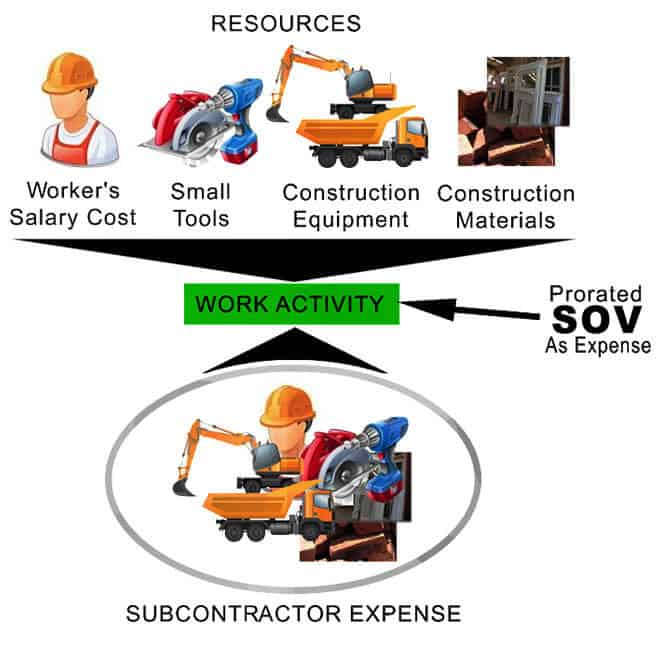
Here are some possible reasons for resource and cost loading:
- Required by the project specification
- Earned-Value will be applied
- Your company wants to plan/track resource flow
- Resources are limited in the area and leveling must be done
- Your schedule updates are being used as the pay application
- This requires the schedule to contain 100% of fully loaded costs
- Subcontractors must be contractually required to provide needed cost breakdowns
- You believe this is good practice
If you choose to resource-load your schedule, ensure that your company records fully support this process. HSE has extensive experience in all resource and cost loading processes and can provide the necessary support to help your project succeed.
Project Projection Cash-Flow Management Monitoring
Benefits of Cash Flow Projection for Your Projects
Your Business Plan:
A well-crafted business plan is essential for all businesses, especially for new business owners. A comprehensive financial projection can enhance the prospects of profitability and reduce losses.
Cash Flow Benefits:
Cash flow projections are a vital component of managing a business. They enable the owner to evaluate a company’s income for a given financial year against the available working capital. The projections are lower for new business owners and higher for established companies. The cash flow projections analyze the available cash or capital needed to initiate a new venture.
For a business to grow or achieve a hiatus, it must initially expend a certain amount of capital. The business capital is used for variable and fixed expenses. While there is a one-time expense that should be made, variable expenses must also be considered. A business owner must assess the expected income from sales of goods or services and calculate the corresponding expenses. Budgeting software is often used for these calculations, as it provides more accurate results and allows data to be inputted for appropriate results.
The usage of budget software also enables more accurate results than manual calculations, and companies or business entities should hire people with appropriate skills to complete these tasks. A business entity should have sufficient cash to allocate funds for different purposes. A significant challenge faced by businesses during the initial period is a shortage of funds, which can also affect businesses that want to achieve further goals.
Appropriate cash flow projections can aid in expanding and growing a business, enabling them to avoid obstacles. Investors can assess a business’s financial position before investing money by reviewing the cash flow statement. Cash flows help businesses determine if they have enough cash to meet immediate financial requirements, and if there is a severe shortage of funds, it’s essential to take immediate action. Cash flow projections or forecasts are useful for businesses related to their future planning, allowing them to modify their previous plan and execute the new plan.
Proper utilization of funds is critical for a business’s success, and negative cash flow can be disastrous. Therefore, it is essential to make accurate cash flow projections to achieve the goals of a business.
Manager’s Reports Generation
The Manager’s report presents data that has been gathered over a period of time for a list of monitors on a group of systems. You have the option to create or save a Capacity Manager report in several file formats, including CMR, TXT, XML, CMS, or HTML. However, please note that HTML files cannot be viewed in the Report Viewer, but they can be viewed in a web browser.
It’s important to note that collected data is retained for at least a month, but the slot file that stores this data is periodically overwritten. To ensure complete data coverage, it’s recommended to generate a report at the same time every month. For instance, if you choose to generate a report on the 24th of the current month, and you select a duration of 30 days, the report will contain data collected from the 24th of the previous month up to the 23rd of the current month. By scheduling your reports to be generated at the same time each month and by combining or merging reports, you can have comprehensive data that covers longer periods.
Recovery Schedule
In the event of delays or other difficulties encountered during a construction project, it is common for the owner to demand that the contractor produce a “recovery schedule.” This schedule outlines the steps the contractor plans to take to meet an accelerated completion date, as requested by the owner.
A recovery schedule differs from a regular schedule update in that it aims to project substantial completion by either the original contract completion date or an earlier date than the current projected completion date. While some construction contracts may have specific requirements for the preparation of a recovery schedule, owners may request one even in the absence of such provisions.
Contractors are advised to properly notice any project impacts that resulted in critical schedule delays before submitting a recovery schedule. This notice should include any impacts that the contractor believes are excusable or compensable under the contract’s terms. Additionally, contractors should inform the owner of the extent of any acceleration effort necessary to meet the recovery schedule’s substantial completion date.
The request for and submission of a recovery schedule often occurs during a stressful time in the project’s lifecycle. Therefore, contractors should continue performance despite disputes over entitlement to time extensions or extra compensation. The provision of proper notice during the recovery schedule submission helps the contractor establish a better legal position and enables the owner to accurately measure the temporal and financial ramifications of adhering to the recovery schedule.
Monthly Updates
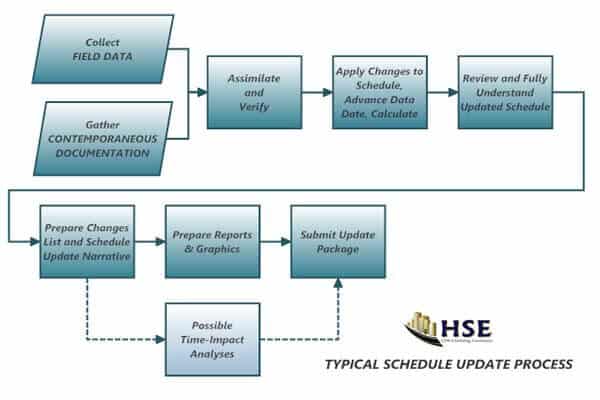
HSE understands the significance of timely and accurate project scheduling for successful project control and forward planning. Therefore, we provide monthly updates that incorporate actual costs (variable and fixed) along with estimated completion costs. The process of updating your project schedule, whether it’s CPM or Linear, involves two basic steps.
Firstly, we collect information from the field and office, which clearly describes what occurred during the update period. This information is often found in contemporaneous documentation. Then, we update the status of scheduled activities and correct any logic that was not performed as planned.
The second part of the updating process involves utilizing historical and job knowledge to revise short-term future forecasts. We assimilate all information and update the schedule completely. Reports, graphic diagrams, and schedule narratives are then prepared.
In cases where the project has experienced identifiable impacts resulting in delayed project milestones, time-impact analysis should be conducted to request change orders.
Our team of CPM scheduling experts has extensive experience in construction claims analysis, delay, disruption, and project acceleration issues. Therefore, we can assist you in developing a schedule that anticipates potential complications and quantifying damages related to scheduling adjustments.
Our CPM scheduling experts also have extensive experience in construction claims analysis and issues involving delay, disruption, and project acceleration. They can therefore assist you in crafting a schedule that anticipates potential complications as well as in quantifying any damages related to scheduling adjustments. Resource/Cost Loading
Related CPM Scheduling Videos
Related Services

Contact Us
Call Us 1-888-398-8283 Our LocationsEmail us for more info about our CPM Scheduling Services
Let Us Contact You
Download our Brochures
Flagship ProjectsMulti-Family Residential Projects
Waste Water & Used Oil Treatment
Residential Projects
Roadways & Bridges Projects
High-rise Projects
Federal Projects
Airport Projects
Commercial Projects
View our Work Samples
4d Modeling SamplesCPM Schedule Report Sample
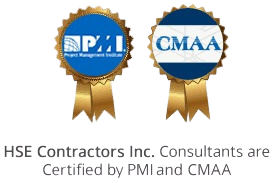
Call Our CPM Scheduling Consultants
Our offices in Orlando, New York City, Boston, Los Angeles, San Francisco, Miami, Tampa, Chicago, Denver, Brooklyn, Dallas, and Washington, DC, Offer Innovative and efficient solutions on a variety of construction projects nationwide, Contact Us Today!

 HSE Contractors is insured by the following professional liability policies, up to $4,000,000 for our clients’ protection:
HSE Contractors is insured by the following professional liability policies, up to $4,000,000 for our clients’ protection:


